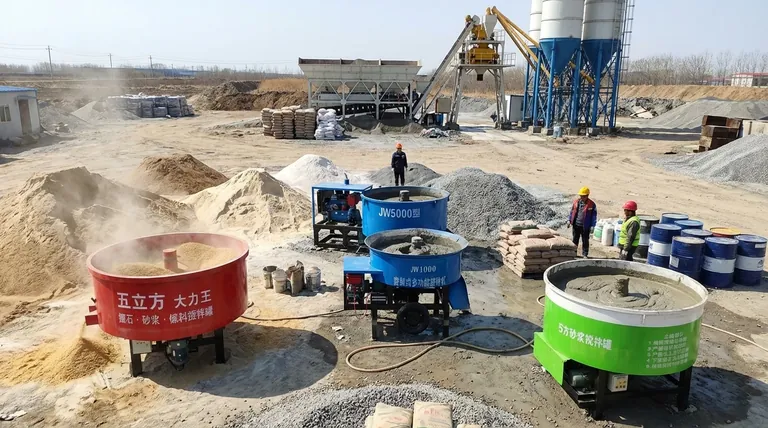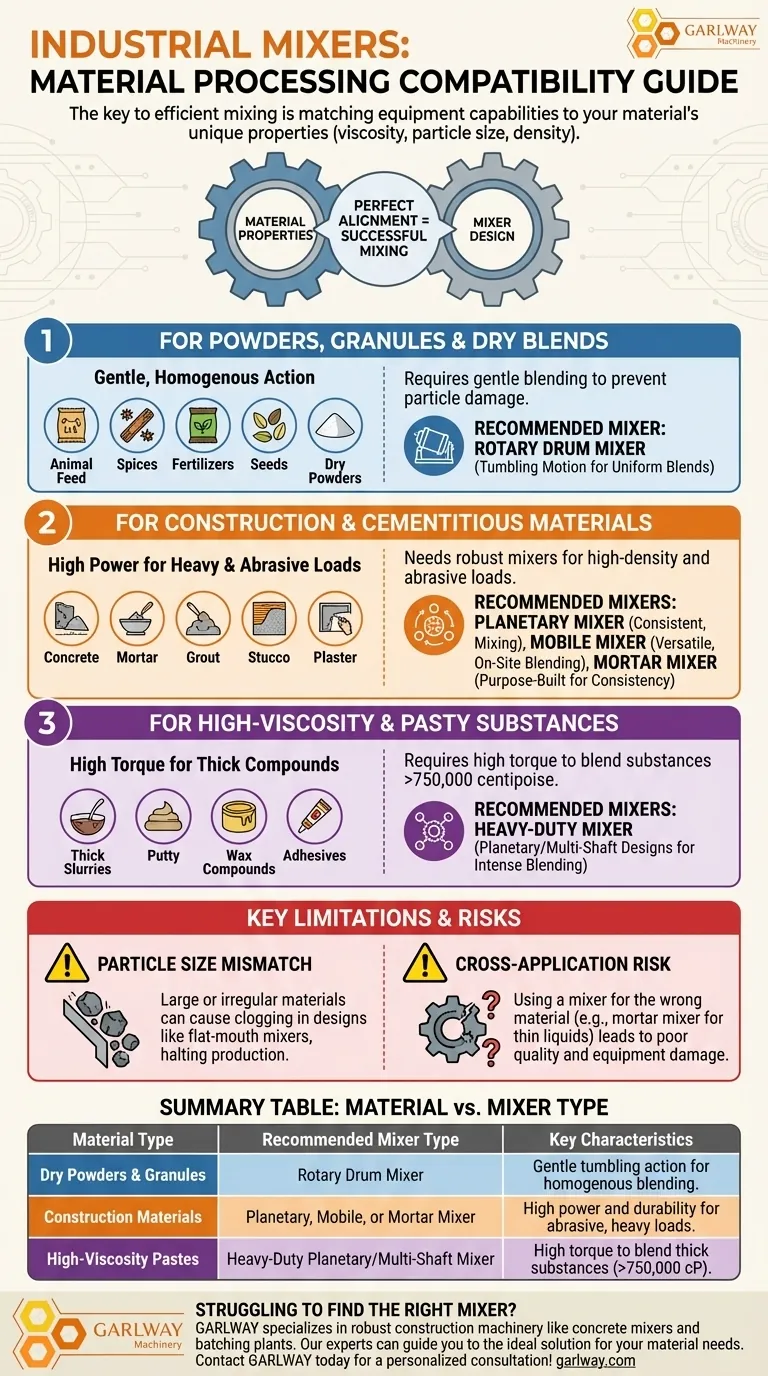At a high level, industrial mixers can process an exceptionally wide range of materials, including everything from dry powders, feeds, and fertilizers to wet slurries, concrete, and high-viscosity pastes. The specific materials a mixer can handle are entirely dependent on its design, power, and mixing action.
The critical factor is not a universal list of approved materials, but rather the precise alignment between a material's properties—such as viscosity, particle size, and density—and the specific type of mixer designed to handle those characteristics.

Why Mixer Design Dictates Material Compatibility
Choosing a mixer is fundamentally about matching a tool to a task. The physical properties of your material will immediately rule out entire classes of mixers while highlighting the few designed for the job.
For Powders, Granules, and Dry Blends
Materials like powders, animal feeds, seeds, spices, and fertilizers require a gentle but thorough action to create a homogenous mixture without damaging the particles.
Rotary drum mixers are well-suited for these applications. Their tumbling motion is effective for blending both dry and wet granules and fibrous materials efficiently.
For Construction and Cementitious Materials
This category includes materials that are often abrasive and heavy, such as concrete, mortar, grout, stucco, and plaster. These require powerful mixers that can handle high-density loads.
Planetary and mobile mixers are specifically engineered for these demanding industrial needs, ensuring consistent and precise mixing of concrete and refractory materials. Mortar mixers are also purpose-built for this category.
For High-Viscosity and Pasty Substances
When dealing with extremely thick materials, standard mixers will stall or fail. Substances like thick slurries, putty, wax compounds, and adhesives with viscosities exceeding 750,000 centipoise require specialized equipment.
Heavy-duty mixers, often with planetary or multi-shaft designs, provide the high torque necessary to effectively blend these challenging, pasty materials.
Understanding Key Limitations and Mismatches
Using the wrong mixer for your material is not just inefficient; it can lead to poor product quality, equipment damage, and production downtime.
The Problem of Particle Size
Some designs, like certain flat-mouth mixers, can struggle with large or irregularly shaped materials. These can cause clogging, which halts production and reduces overall effectiveness.
Materials with large aggregate may need to be pre-processed, or a more suitable mixer type must be selected to handle them.
The Risk of Cross-Application
A mixer designed for one purpose is rarely ideal for another. For example, a mortar mixer is optimized for the weight and consistency of mortar and concrete.
Attempting to mix other materials, like thin liquids or light powders, can not only produce a poor-quality blend but may also damage the mixer's components over time.
Selecting the Right Mixer for Your Material
To ensure efficiency and quality, base your decision on the primary characteristics of the material you need to process.
- If your primary focus is on dry, granular, or powdered goods: A rotary drum mixer is often the most effective choice for achieving a consistent blend without damaging the product.
- If your primary focus is on heavy construction materials: Purpose-built planetary, mobile, or mortar mixers are essential for handling the high density and abrasive nature of concrete, grout, and stucco.
- If your primary focus is on thick, paste-like substances: You must use a heavy-duty mixer with the required torque to handle high-viscosity compounds like putty, slurries, and adhesives.
Ultimately, successful mixing is achieved when the equipment's capabilities are perfectly matched to the demands of your material.
Summary Table:
| Material Type | Recommended Mixer Type | Key Characteristics |
|---|---|---|
| Dry Powders & Granules (e.g., feeds, spices) | Rotary Drum Mixer | Gentle tumbling action for homogenous blending without particle damage. |
| Construction Materials (e.g., concrete, mortar) | Planetary, Mobile, or Mortar Mixer | High power and durability for abrasive, heavy-density loads. |
| High-Viscosity Pastes (e.g., putty, adhesives) | Heavy-Duty Planetary/Multi-Shaft Mixer | High torque to effectively blend thick substances (>750,000 cP). |
Struggling to find the right mixer for your specific materials?
GARLWAY specializes in engineering robust construction machinery, including concrete mixers and batching plants, designed for the demanding needs of construction companies and contractors globally. We can help you select the perfect equipment to match your material's properties, ensuring maximum efficiency, product quality, and equipment longevity.
Let our experts guide you to the ideal solution. Contact GARLWAY today for a personalized consultation!
Visual Guide

Related Products
- Ready Mixer Machine for Construction Ready Mix Machinery
- Construction Products Concrete Plant Machine Mixing Concrete Mixer
- Concrete Cement Mixer Machine Drum Mixer for Construction
- HZS25 Best Cement Mixer for Quick Mix Concrete at Bunnings
- JZC400 Mobile Small Concrete Mixer Cement Mixer Machine
People Also Ask
- Can a concrete mixer be used for mortar? Understanding the trade-offs for your project
- What safety considerations are important for concrete mixer operation? A Guide to Proactive Risk Management
- What is the function of a concrete mixer machine? Achieve Consistent, High-Quality Concrete for Your Projects
- Why is the manufacturer's strength and service important when choosing a concrete mixer? Ensure Long-Term Project Success
- What is the average lifespan of a concrete mixer? Maximize Your Equipment's Lifespan & ROI



















